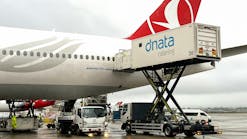Essential Services to Air Transport Such as Ground Handling Must be Further Promoted
There seems to be some respite in the way the Covid-19 pandemic is spreading and bar a few cases where signs of a possible second wave have been spotted, public health conditions seem to have markedly improved lately. As a logical consequence, air traffic and passengers are slowly resuming now that travel restrictions are gradually being lifted. But this recovery remains very timid and fragile, on top of being very slow. And whilst we all want to look at the glass half full, the numbers don’t quite add up yet. On a year-on-year comparison, the world traffic was still down more than 60% throughout June, after having flirted in March and April with a mind-blowing 90% drop.
This frail recovery is like fresh air to the industry, but it may raise false hopes. There will be a natural tendency to consider that a page has been, or is about to be, turned and that things are coming back to normal. But even in the best of scenarios, we are persuaded that traffic won’t resume to 2019 figures before at least mid-2022 at best! In the meantime, the industry has been faced with several months (around 4) of literally zero revenue.
Airlines have so far been able to retain most of their skilled personnel, partly thanks to the generous supporting measures they have received from many governments – which injected up to $150 billion of taxpayers’ money to keep them afloat on the ground they are strategic assets to the country. As a consequence, the vast majority of them have been able to weather the storm and, after adapting to the new reality and getting rid of the superfluous, will be able to ramp up their operations and accompany the recovery. Each time, we applauded these supportive measures without which the whole air transport industry as we know it would have simply ceased to exist.
But while many airlines have been given the capacity to adapt, the same cannot be said of other elements of the air transport eco-system. With very little of this public manna trickling down to airline contractors, they have had to furlough in the best case, or lay off massively throughout the pandemic. Ground handling, by far the most important contracting stakeholder, represented before the pandemic a total combined workforce of close to half a million employees worldwide, around 150,000 in Europe alone. According to our statistics, the sector employs less than 50% of its staff right now.
Around two thirds of the total ground-handling operations, including such central features as check-in, transport of passengers from the terminal to the aircraft, handling of luggage, but also activities such as de-icing and/or refuelling, are actually run and operated by independent – i.e. private – ground-handling companies. The distinction is important as, being independent, they don’t enjoy the same benefits of governmental support as their competing airline or airport subsidiaries do. This creates unfair competition, contributes to raising ground-handling costs and hence negatively impacts recovery.
The double whammy of an almost inexistent income for a sizeable period of time, a slow and uncertain recovery combined with a lack of public help is quickly kicking in, and we very much fear that in the weeks and months to come many ground handlers, irrespective of their size and location, will not make it anymore. This is bad news on several accounts: airlines need our services just as we need them. With the majority of our personnel currently unemployed, it can take up to 3 months to (re-) hire, train and badge them. Given the financial distress the sector is in, we will not take the initiative of resuming activities without a number of guarantees, and will require that any demand from the airlines be substantiated and contractually sound. Airlines in turn find it difficult to commit. These uncertainties prompt ground handlers to be cautious and to only start effective re-hiring when they are certain their contract will be honoured. This chicken and egg situation will lead to the creation of bottlenecks, and already generates unwanted hurdles in a slow recovery scenario.
What is worth, these bottlenecks can and will become a pretext for newcomers pretending to do the job at costs more in line with the expectations of cash-stripped airlines focusing on the restart. With adverse effects on, first and foremost, safety, not to speak of the financial viability of a sector whose margins are historically very low. Whilst the industry has generally impeccable safety track records, there are currently no Annexes from ICAO solely dedicated to ground-handling. There do exist industry standards, but they are not compulsory, and vary widely in terms of implementation and follow-up.
We are afraid these extreme circumstances might lure companies into cutting corners, which is why we urge governments and air transport authorities to:
1. Extend the ground handlers’ licences that were due to expire between 01/01/2020 and 31/12/2020 for at least 2 additional years without any additional costs;
2. Guarantee to support, in some form to be determined, ground handlers with their employment costs beyond the initial deadline (many were due by the end of June, some in September) and if possible until at least the end of 2020;
3. Require that ground handlers and airlines operating have an SMS in place that is, as a minimum, compliant and aligned with ICAO Annex 19 and IATA AHM;
4. Implement a new type of minimum standard based on a ground handlers’ self declaration and following a form of validation from the airports they are based at;
5. Implement and follow throughout the EU the same procedures, for instance based on the IATA and ACI guidance documents relative to the return to normal operations, notably in terms of who is legally and financially responsible for what (temperature control, decontamination, cleaning, etc.) such as:
- https://www.iata.org/en/programs/covid-19-resources-guidelines/
- https://aci.aero/about-aci/priorities/health/covid-19/
6. Consider fast track hiring procedures for personnel that have received security clearance beforehand and who have lost their position during the pandemic;
7. Press ICAO and other regional bodies such as the European EASA to continue the essential work they are doing on imposing ground handling minimum standards;
8. Perhaps more importantly, initiate a lasting dialogue with the ground-handlers that operate at their airports. ASA would gladly help liaise and put the authorities and the ground-handling community in contact if requested.
This is quite simply the biggest and most challenging crisis ever faced by our industry. On behalf of our companies everywhere in the world, we appreciate all the authorities’ continued support and commitment to urgent action.
Because without ground handling, there can be no aviation.
Yours sincerely,
Fabio Gamba
Director General
Airports Services Association (ASA)





